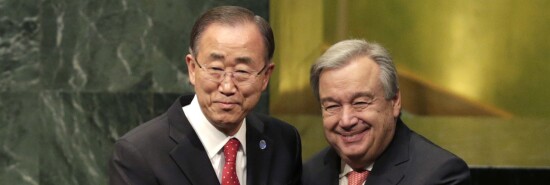
Congress should compel current and former UN leaders to explain their failures
Michael Rubin
Video Embed
The United Nations could not function without the United States. While every U.N. member must contribute to the organization’s budget to fund administrative costs, the U.S. contributes more than others. In 2023, the U.N. asked the U.S. to provide its usual 22% of its operating budget and asked taxpayers to foot the bill for 27% of peacekeeping expenses, although Congress caps this donation at 25%. Put another way, the U.N. charges the U.S. almost twice as much as China, five times as much as fellow Security Council members France and the United Kingdom, and nine times as much as Russia.
The Biden administration has further increased donations to the U.N. above these figures by restoring donations to the U.N. Relief and Works Agency for Palestine Refugees in the Near East and other controversial bodies and contributing to emergency drives. U.S. donations to the U.N. equate to about one-quarter of the $51 billion the U.S. spends on direct foreign aid.
BIDEN TELLS REPORTERS TO START REPORTING ON THE ECONOMY ‘THE RIGHT WAY’
For too long, the U.N. has treated such funds as an entitlement and eschewed accountability for their proper management. Turtle Bay oozes anti-Americanism. Secretaries-general view themselves more as the world’s top diplomats, not as administrators to ensure proper management.
The lack of accountability costs lives. In Kenya, the U.N. High Commissioner for Refugees engaged in collective punishment, depriving women and children in camps of food to retaliate for protests that destroyed a feeding pen.
In Haiti, U.N. peacekeepers dumped sewage into a waterway, leading to a cholera epidemic that killed thousands. U.N. peacekeepers engaged in multiple instances of sexual abuse in conflict zones. After the venality of Kofi Annan, the director of U.N. peacekeeping at the time, enabled the 1994 anti-Tutsi genocide in Rwanda, he failed upward to become secretary-general, during which he presided over the worst corruption scandal in U.N. history.
The wholesale diversion of U.N.-administered humanitarian assistance to Gaza approaches the same magnitude of scandal. While former Secretary-General Ban Ki-moon labels Israel an apartheid state and exculpates Hamas, and while his successor Antonio Guterres condemns Israel and draws a moral equivalence between rapist and victim, gunman and hostage, and terrorism and self-defense, UNRWA held hostages and allowed its facilities to store weaponry. With UNRWA’s knowledge, Hamas built headquarters under hospitals and an elaborate tunnel system utilizing diverted humanitarian assistance, concrete, and fuel. Guterres and his underlings deflect and deny, but evidence mounts each day. UNRWA knew the problems decades ago.
The U.S. Congress cannot force testimony as Ban and Guterres are not U.S. citizens. Nor do foreigners, with very few exceptions, testify in Congress. Rather, they have “meetings.” The phraseology is less important than the substance: Congressional leaders should invite the current and former secretary-generals to appear to explain:
How UNRWA enabled Hamas, What the U.N. is doing to hold UNRWA employees to account, What reform plans, if any, the U.N. has for UNRWA, or whether it would be preferable to fold UNRWA’s operations into the U.N. High Commissioner for Refugees, and The legal and policy basis and deliberations that colored the decisions of both men to condemn Israel and draw moral equivalence with Hamas.
CLICK HERE TO READ MORE FROM THE WASHINGTON EXAMINER
Naturally, Ban and Guterres, let alone the U.N. bureaucracy, will circle the wagons and resist testimony. That is their prerogative, but if the U.N.’s former and current chief administrators do not wish to identify and address problems, then it behooves the U.S. to suggest a freeze on all contributions to the U.N. until either they do so or Guterres resigns and his successor chooses to right the U.N.’s wrongs.
American taxpayers should never subsidize terrorism. Whether deliberately or through the incompetence of their management, that is exactly what Ban and Guterres have allowed.
Michael Rubin is a contributor to the Washington Examiner’s Beltway Confidential blog. He is director of policy analysis at the Middle East Forum and senior fellow at the American Enterprise Institute.
